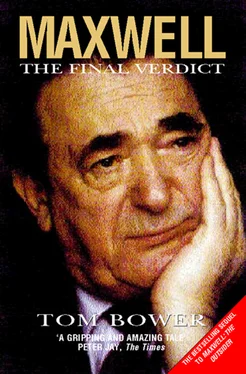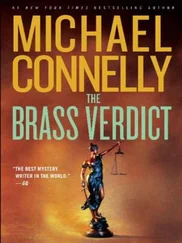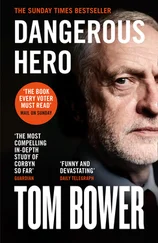That month, Kevin began negotiating the extension of loans for MCC and the private companies with dozens of the banks. His negotiations with Julie Maitland persuaded her to write a new strategy paper about MCC (following one composed the previous July). Once again the bank, which had accepted £100 million in collateral for private loans, failed to take account of the fact that the shares were registered in the name of BIM. Some would claim that the omission was proof of negligence. The bank would plead ignorance, insisting that it had no duty to investigate.
Robert Maxwell’s palliative for the problems was to board the Gulfstream. On Sunday, 12 January he flew for dinner to Munich, departing early the following morning for New York to embark on a renewed effort to sell his Central European Fund on the West Coast. By the 20th his absence from London had fractured his relationship with reality. Instead of seeking solutions to MCC’s indebtedness, he flew to Bulgaria and then Croatia with Rudi Perpich, the former governor of Minnesota, to negotiate investing millions of dollars in those countries’ newspapers and television services. His hopes of profits were distant dreams. In London, the reality was increasing turmoil within the Maxwell empire caused by fears that the auditors’ finalization of BIM’s accounts might instigate a new dispute among LBI’s directors.
The trouble had started when Mark Tapley, LBI’s managing director, had returned to work on 2 January to find Larry Trachtenberg sitting in the office. ‘I don’t know what your role is in this firm,’ Tapley said angrily to the fat American, ‘but you’re meant to be out.’ Trachtenberg shrugged; despite Kevin’s promise to halt the stock lending, he had not been removed.
Unknown to Tapley, Maxwell had received a report from John Pole, the head of security, about Trachtenberg’s strange activities. During a routine search for a missing cassette tape of Trachtenberg’s telephoned market dealings, Pole discovered that the American was being threatened by a BIM employee. After some negotiations, a woman deposited the tape at the Mirror headquarters’ reception. Maxwell had clearly decided to ignore the incident, for Trachtenberg had celebrated his fortieth birthday hosting an expensive party at Mossiman’s, the Knightsbridge restaurant.
Trachtenberg was clearly secure within the Maxwell citadel. That very day, 2 January, he had typed a memorandum to the Maxwells setting out his value to them, now that it was time to calculate the 1990 bonus. Not only had he arranged transactions totalling $725 million in the previous year, but, he added in chilling prose, ‘If one were to include stock loans which were ultimately used in cash generation exercises, the total would easily surpass $1 billion.’ There it was, a stark admission of the misuse of the funds. Not surprisingly, his bald statement of facts encouraged Maxwell to increase Trachtenberg’s salary to £200,000 and to add a 10 per cent contribution towards his pension, a performance bonus of £100,000, a car and a rent-free house estimated to cost the London & Bishopsgate Group £78,000 every year.
These favours had not gone through without internal opposition. Gillie Bryson, an accountant, had noted to Kevin that Trachtenberg’s income had risen 154 per cent in two years and that he was ‘earning more than many of the top Chief Executives of the top FT-SE 100 companies’, despite the loss by London & Bishopsgate Holdings (LBH) of ‘a great deal of money’. Although Bryson complained, ‘I am at a loss to understand what possible justification there would be for any bonus to be paid,’ the Maxwells understood Trachtenberg’s value very well. Keen to capitalize on that sentiment, Trachtenberg’s latest proposal was that he exchange his shares in LBH, estimated by himself to be worth £250,000, for his house, which was valued £599,000. Although LBH was actually worthless, the Maxwells had agreed to consider his proposition.
Trachtenberg’s inviolability encouraged Tapley’s anxiety to resign, but he was persuaded by Anselmini, Willett and especially Bernard ‘Manuel’ Donoughue ‘not to rock the boat’. Pointing to the letters from lawyers and accountants approving the stock-lending scheme, Donoughue urged, ‘We’re going to arrange a buy-out of LBI so we can keep it for ourselves.’ Tapley was becalmed. By then, Trachtenberg was concealing the use of the pension fund shares while John Cowling completed BIM’s accounts.
On 5 February, Cowling asked Cook for a detailed explanation of the stock lending. He was answered with a statement of ignorance. Cook replied, ‘I don’t know much about the arrangements except that I have an agreement with LBI.’ In his files was a letter from Trachtenberg sent in early January assuring him that all BIM’s assets were safe. Attached to that letter was a note from the American acknowledging receipt at LBI of another batch of shares owned by BIM. Unknown to Cook, on that very day Trachtenberg had sent those same shares to Crédit Suisse to raise more money.
Cowling’s questions raised doubts in Cook’s mind. Three days later, on 8 February, he met Maxwell and asked for assurances about the stock lending. Since the beginning in December 1988, over £200 million of pension fund shares had been passed over on Maxwell’s orders to Trachtenberg. ‘Everything’s fine,’ said BIM’s chairman, not revealing that at 3 p.m. that day Kevin would telephone Julie Maitland to ask for a further $3 million loan guaranteed as he knew by pension fund shares.
Cook’s sanguine response to this reassurance did not immediately placate Cowling. By mid-February, the auditor had become puzzled by Trachtenberg’s vague replies, especially after he had provided two different lists of the pension fund shares held by LBI. There were other good reasons for Cowling’s unease. He had not seen any written authorization for the stock lending from BIM’s directors; and there was a letter from Mark Haas of Lehmans confirming that the pension fund’s shares handed over by Invesco were held as ‘collateral for loans in connection with the stock-lending agreement’. (Haas would subsequently claim that either Trachtenberg or Cook had composed the letter.)
In an attempt to clarify his confusion, on 13 February Cowling listened to a telephone conversation between Cook and Trachtenberg. ‘Can you put the whole position in writing because it seems you’re doing collateral swaps which aren’t authorized?’ asked Cook. Trachtenberg’s replies clearly contradicted his earlier explanations. Talking about Lehmans, he actually mentioned ‘collateral swap’, a term which should have alarmed Cowling.
Although Trachtenberg did accurately say, ‘There was no stock-lending position with Lehmans on 5 April 1990,’ he confused the auditor by saying of the later agreement, ‘The Treasury bills are held as collateral for the stock’ for BIM’s account. Subsequently Cowling received a similar assurance from Mark Haas, who stated in a letter that the BIM shares were held as collateral under the stock-lending agreement. In fact, Haas knew this was not conventional stock lending, only pure borrowing against collateral.
By then, other matters should also have aroused the auditor’s suspicions: Maxwell had ‘invested’ £5 million of BIM’s money in the Robert Fraser Group, the private bank chaired by Lord Rippon; BIM had ‘deposited’ £69.7 million in cash with LBI; a Maxwell private company had ‘borrowed’ £37.6 million cash from the pension funds; and BIM’s stake in MCC had doubled from 13 to 25 million shares.
There was one simple chore which Cowling should have undertaken to complete his audit. The original certificates for all the shares managed by BIM ought to have been seen and ticked off the inventory. Cowling’s problem was that the certificates were scattered in more than one dozen places and in several countries. Instead of demanding sight of each certificate from Trachtenberg, he was content to be shown photocopies or to listen to the American’s oral explanation that the missing certificates would be produced in the future. ‘Don’t worry, it’s all part of the normal stock-lending arrangements,’ gabbled Trachtenberg, and the auditor was persuaded.
Читать дальше












